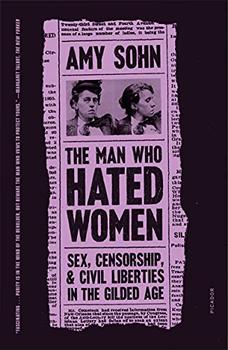Summary | Excerpt | Reviews | Beyond the Book | Readalikes | Genres & Themes | Author Bio

Critics' Opinion:
Readers' Opinion:
First Published:
Jul 2021, 400 pages
Paperback:
Jul 2022, 400 pages
 Book Reviewed by:
Book Reviewed by:
Rose Rankin
Buy This Book
They laid the groundwork for the eventual legalization of birth control and protection of American women's abortion rights. Goldman located the necessity for birth control in the context of economic oppression, while Sanger moved away from such a class-based justification in order to broaden its appeal. Sanger believed in, and popularized, the idea that women were different from men, and could coalesce to fight for what they deserved as a group, as a gender.
The radicals' attitudes arose from romantic, not hedonistic, ideals. If anything, they could be accused of being too idealistic about sex—they elevated it, believing in its power to unite man and woman. If marriage were reconceptualized as a romantic institution, entered into on the basis of love instead of money, it could yield greater liberty for women. Though most were not scientists, they had an earnest, scientific view of sex. Energy was exchanged. Currents went back and forth. (Many free lovers viewed sex as an exchange of electric or magnetic forces—dubbed magnetation.) Nudity could increase intimacy. If only women could be in charge of sex! If men listened to women, families would be stronger; if reasonable people married reasonably, there would be fewer unintended pregnancies.
This last concept stemmed from a romanticized view of the heterosexual bond. If women could experience sex as exalted and hallowed, and if they could play some role in selecting a partner, then they could have and control their own orgasms, bear fewer babies, and enjoy sex more. They would learn to recognize the difference between amative and procreative sex. When they did, they would see that amative sex had its own valid aims.
Despite their extraordinary contributions to civil liberties, most of the sex radicals have been written out of feminist history (they were too sexual), sex history (they were not doctors), and progressive history (they were women). Nonetheless, they were the connective tissue between nineteenth-century abolitionism and twentieth-century free speech. The free speech historian David M. Rabban calls nineteenth-century freethinkers "libertarian radicals." They opposed laissez-faire capitalism and the idea that progressive thought required social harmony. Both free thought and free love, Rabban writes, "interposed personal sovereignty and rationality in social, religious, and sexual spheres against the power of church and state." Libertarian radicals such as Woodhull, Angela Heywood, and Craddock laid the foundation for the modern civil liberties movement and the formation of the American Civil Liberties Union (ACLU). The Free Speech League (1902–1917), which counted Goldman as an early supporter, was a predecessor of the ACLU, itself founded in 1920. Sex radicals, who based their ideas on individual autonomy, made free speech possible.
In their willingness to take on a monomaniac whose mission was to keep contraception and abortion from women, they paved the way for early twentieth-century "birth controllers" and 1970s feminists alike. Risking destitution, imprisonment, and death, they defined reproductive liberty as an American right, one as vital as those enshrined in the Constitution. They brought women's reproductive rights to the public dialogue. Without them, there would be no Pill, no Planned Parenthood, no Roe v. Wade. And yet, more than fifty years after Sanger's death, reproductive rights are still a battleground. Without understanding the sex radicals, we cannot fight the assault on women's bodies and souls that continues even today.
Excerpted from The Man Who Hated Women by Amy Sohn. Copyright © 2021 by Amy Sohn. Excerpted by permission of Farrar, Straus & Giroux. All rights reserved. No part of this excerpt may be reproduced or reprinted without permission in writing from the publisher.





The Funeral Cryer by Wenyan Lu
Debut novelist Wenyan Lu brings us this witty yet profound story about one woman's midlife reawakening in contemporary rural China.
Your guide toexceptional books
BookBrowse seeks out and recommends the best in contemporary fiction and nonfiction—books that not only engage and entertain but also deepen our understanding of ourselves and the world around us.